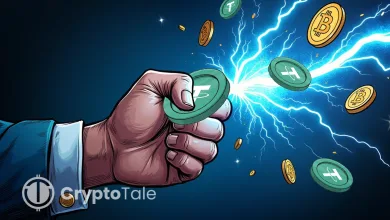Eric Balchunas Says, “Private Credits Are Deathly Afraid of An Actual Market”

- Private credit resists real-time pricing, raising concerns about hidden risks and stability.
- DeFi offers 24/7 transparency, contrasting with private credit’s opaque, artificial stability.
- Eric Balchunas highlights a contradiction in private credit’s push for retail market access.
Real-time pricing and market exposure are facing opposition from private credit firms that are fearful of concealed dangers and artificial stability. The contrast to this resistance is the transparent, on-chain markets of decentralized finance (DeFi), where assets are marked to market 24/7. This unwillingness to be open promotes the argument that DeFi is a more responsible and sustainable solution.
The private credit business has turned into a multitrillion-dollar industry. Institutional investors are drawn to it because it is considered stable and non-volatile. Nevertheless, the absence of real-time pricing ensures that the actual value of loans remains unknown. The risk is often not known to investors due to the market’s lack of transparency.
The Illusion of Private Credit’s Stability
The floating rate of private credit loans is sold as protection against increasing interest rates. This creates the perception that private credit is less exposed to market fluctuations. Nonetheless, such stability has depended on a lack of real-time market data. The absence of on-demand pricing allows private credit firms to revalue loans in secret, concealing any financial trouble.
According to financial analyst Eric Balchunas, there is a significant contradiction in the private credit sphere. According to the analyst, the companies aim to democratize their portfolios and are targeting the retail market. But, they are afraid of establishing a real market for these assets.
Balchunas claims that they would lose the illusion of price stability they sold to institutional investors in the case of transparency. Although they are keen to sell their assets, they fear that open trading would expose the unstable situation, which would lead to investors losing confidence.
Related: JPMorgan Files JPMD Trademark to Expand Crypto Services
The fear of credit firms toward embracing transparency stems from their need to protect their business model. With prices concealed, they can offer their loans as steady investments. However, this artificially induced stability is risky, especially as the market matures and more investors enter the market.
Private Credit’s Control vs. DeFi’s Transparency
Bloomberg’s report revealed, that some firms are even pushing back against JPMorgan by requesting that their loans be excluded from the bank’s trading lists. It is a strategy to restrict exposure and loan quoting at lower prices. These companies desire to regulate the valuation and trade of their loans.
A prominent situation described by Bloomberg involves the company’s traders offering a price of more than 90 cents on the dollar when valuing the loan. This was despite the company being engaged in silent debt restructuring, and lenders were valuing the debt at just 50 cents. Pricing gaps like these are not an exception in the private credit market.
The reluctance of private credit to be priced in real-time is raising fears of concealed risks and synthetic stability. DeFi and its on-chain transparent markets provide a more reliable alternative. With more people demanding transparency, decentralized finance can offer the stability and accountability that private credit firms often lack.




